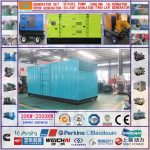Introduction
In remote areas or islands with limited access to the main power grid, ensuring a reliable source of electricity is crucial for the residents and businesses. One common solution to this challenge is the use of diesel generators for islanding operation. Diesel generators are known for their robustness, reliability, and ability to provide power independently of the main grid. In this article, we will explore the use of diesel generators for islanding operation, their benefits, challenges, and best practices for ensuring a stable power supply in remote areas.
Overview of Diesel Generators for Islanding Operation
Diesel generators are a popular choice for islanding operation due to their ability to provide a continuous and reliable power supply in remote areas. Islanding operation refers to the ability of a power system to operate in isolation from the main grid. In this mode, the diesel generator acts as the primary source of power, providing electricity to the local grid and meeting the energy demand of the connected loads.
Key Components of a Diesel Generator System for Islanding Operation
A diesel generator system for islanding operation consists of several key components that work together to ensure a stable and reliable power supply. These components include:
1. Diesel Generator: The heart of the system, the diesel generator converts chemical energy stored in diesel fuel into electrical energy through the process of combustion. Diesel generators are available in various sizes and configurations to meet different power requirements.
2. Automatic Voltage Regulator (AVR): The AVR regulates the output voltage of the generator to maintain it within a specified range, ensuring a stable power supply to the connected loads.
3. Engine Control Unit (ECU): The ECU monitors and controls the operation of the diesel engine, optimizing performance, fuel efficiency, and emissions.

4. Synchronization System: In islanding operation, multiple diesel generators may be connected in parallel to meet the power demand. The synchronization system ensures that the generators operate in phase and maintain a balanced load distribution.
5. https://www.lkpowerplant.com/how-to-calculate-the-efficiency-of-a-diesel-generator/ : To prevent damage to the generator and connected equipment, a protection system is essential. It includes features such as overcurrent protection, overvoltage protection, underfrequency protection, and overtemperature protection.
Benefits of Diesel Generators for Islanding Operation
1. Reliability: Diesel generators are known for their high reliability and robustness, making them well-suited for islanding operation where access to the main grid is limited. They can provide a continuous power supply even in harsh environmental conditions.
2. Fuel Efficiency: Diesel generators are more fuel-efficient compared to gasoline generators, resulting in lower operating costs over the long term. The efficiency of diesel engines also contributes to reduced fuel consumption and lower emissions.
3. Quick Start-Up Time: Diesel generators can start up quickly and reach full operating capacity within minutes, ensuring a rapid response to power outages or fluctuations in demand.
4. Scalability: Diesel generators are available in a wide range of sizes and power capacities, making them scalable to meet different energy needs in remote areas.
Challenges of Diesel Generators for Islanding Operation
While diesel generators offer numerous benefits for islanding operation, they also present some challenges that need to be addressed to ensure a reliable and efficient power supply. Some of the key challenges include:
1. Fuel Storage and Management: Diesel fuel needs to be stored on-site for refueling the generators, which requires adequate storage facilities and proper fuel management practices to prevent contamination or degradation of the fuel.
2. Maintenance and Service: Regular maintenance and service of diesel generators are essential to ensure their reliable operation. Remote locations may pose challenges in terms of access to skilled technicians and spare parts.
3. Environmental Impact: Diesel generators emit pollutants such as nitrogen oxides (NOx), particulate matter, and carbon monoxide, which can have negative environmental impacts. Proper emission control measures and compliance with regulations are necessary to mitigate these effects.
4. Cost of Operation: While diesel generators are cost-effective in the long run, the initial investment and operating costs can be higher compared to other power generation technologies. Factors such as fuel prices and maintenance expenses need to be considered.
Best Practices for Ensuring a Stable Power Supply with Diesel Generators
To ensure a stable power supply in remote areas using diesel generators for islanding operation, it is important to follow best practices and implement effective strategies. Some of the key practices include:
1. Regular Maintenance: Scheduled maintenance of diesel generators, including engine inspections, oil changes, filter replacements, and testing of critical components, is essential to prevent breakdowns and ensure reliable operation.
2. Fuel Quality Management: Proper storage, filtration, and monitoring of diesel fuel quality are crucial to prevent fuel degradation and maintain the efficiency of the generators. Regular fuel testing and treatment can help mitigate issues related to fuel contamination.
3. Remote Monitoring and Control: Implementing a remote monitoring and control system for diesel generators allows operators to track performance metrics, detect faults or anomalies, and take corrective actions in real time. This enhances the reliability and efficiency of the power system.
4. Load Management: Managing the load on the diesel generators by prioritizing critical loads, implementing demand-side management strategies, and optimizing the use of energy storage systems can help balance power supply and demand, improving overall system stability.
5. Compliance with Regulations: Adhering to environmental regulations and emission standards is crucial for operating diesel generators in islanding mode. Implementing emission control technologies, conducting regular emissions testing, and maintaining compliance records are essential practices.
Conclusion
Diesel generators play a vital role in providing a reliable power supply in remote areas or islands where access to the main grid is limited. Their robustness, reliability, and scalability make them well-suited for islanding operation, ensuring continuous electricity supply to residents, businesses, and critical infrastructure. By following best practices, addressing challenges, and implementing effective strategies, operators can maintain a stable power system with diesel generators and contribute to the sustainable development of remote communities.
